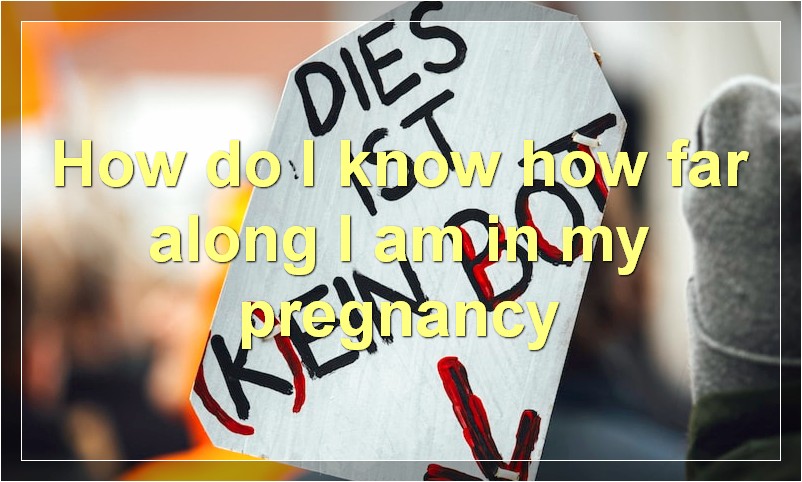If you think you might be pregnant, it’s important to know the early signs and symptoms, as well as the average length of pregnancy. Miscarrying is also a possibility, so it’s important to be aware of all the potential outcomes.
regnancy}How can I tell if I’m pregnant
If you’re wondering how to tell if you’re pregnant, here are a few early signs and symptoms of pregnancy that you may experience.
One of the first signs of pregnancy is a missed period. If you’re regularly sexually active and have suddenly stopped getting your period, there’s a good chance you could be pregnant.
Another early sign of pregnancy is changes in your breasts. You may notice that your breasts are tender to the touch, or that they’ve grown larger. You may also notice darkening around your nipples.
Nausea and vomiting are other early signs of pregnancy. This is often called “morning sickness,” but it can happen at any time of day.
Fatigue is another common symptom, as your body is working hard to support a growing baby. You may find yourself feeling exhausted, even if you’ve had a full night’s sleep.
If you’re experiencing any of these symptoms, take a pregnancy test to find out for sure.
How do I know how far along I am in my pregnancy
If you’re wondering how far along you are in your pregnancy, there are a few things you can do to figure it out. One way is to count the number of weeks since your last period. Another way is to get an ultrasound, which will give you a more accurate picture of how far along your baby is. You can also ask your healthcare provider for an estimate.
What are the early signs and symptoms of pregnancy
The early signs and symptoms of pregnancy can be different for every woman. Some women may experience all of the early signs and symptoms of pregnancy, while others may only experience a few. The most common early sign of pregnancy is a missed period. Other early signs and symptoms of pregnancy can include:
-Nausea or vomiting (“morning sickness”)
-Breast tenderness or changes
-Frequent urination
-Fatigue
-Headaches
-Food cravings or aversions
-Heartburn
-Constipation
What is the average length of a human pregnancy
The average length of a human pregnancy is about 40 weeks, or just over nine months. This can vary slightly from woman to woman, and also depends on factors such as whether it is a first pregnancy or not.
How often do women miscarry in early pregnancy
Miscarriage is a term used for a pregnancy that ends on its own, within the first 20 weeks of gestation. About 10 to 20 percent of known pregnancies end in miscarriage. But the actual number is likely higher because many miscarriages occur before the pregnancy is recognized.
There are many different factors that can contribute to miscarrying, but the most common cause is simply chromosomal abnormalities in the embryo. Most spontaneous abortions are caused by abnormal chromosomes. In fact, more than 60% of spontaneous abortions are caused by an abnormal number of chromosomes.
Age is also a factor. Women over the age of 35 are more likely to miscarry than younger women. This is likely because as women age, they are more likely to have eggs with chromosomal abnormalities. Other risk factors include:
• A history of previous miscarriages
• Exposure to certain chemicals or drugs
• Certain infections
• Diabetes
• Thyroid disorders
• Uterine abnormalities
• Polycystic ovary syndrome (PCOS)
If you have experienced a miscarriage, it is important to remember that it is not your fault. Miscarriage is a very common event, and it is often out of your control. If you have had multiple miscarriages, there are some tests that can be done to help determine if there is an underlying cause. However, in many cases, the cause of recurrent miscarriages remains unknown.
What is the most common cause of pregnancy loss
There are many possible causes of pregnancy loss, but the most common cause is implantation failure. This occurs when the embryo fails to implant in the uterus, and can happen for a variety of reasons. Sometimes, the embryo is simply not healthy enough to survive, or the mother’s body is not hospitable to it. In other cases, the embryo may be damaged as it travels through the mother’s reproductive tract.
Whatever the cause, implantation failure is thought to account for up to 70% of all pregnancy losses. This makes it by far the most common cause of pregnancy loss, although it is still relatively rare overall. If you have experienced a pregnancy loss, know that you are not alone and that there is no single cause.
What are the chances of having a healthy baby after miscarrying
There is no definite answer to this question as every pregnancy is different. However, the chances of having a healthy baby after miscarrying do increase with each successive pregnancy. There are many factors that contribute to a successful pregnancy, including age, health, lifestyle, and genetic make-up. With each passing year, we learn more about how to optimize these factors for a successful pregnancy.
So, while there is no guarantee that you will have a healthy baby after miscarrying, the chances are certainly greater than they were before. And, each new pregnancy gives us an opportunity to learn more about how to create the best possible environment for a healthy baby.
Can anything be done to prevent miscarriage
Miscarriage is one of the most common complications of pregnancy, and unfortunately, there is not much that can be done to prevent it. However, there are some things that can be done to lower the risk of miscarrying. For example, getting early and regular prenatal care can help identify any potential problems with the pregnancy early on. Additionally, avoiding risky behaviors like smoking and drinking alcohol can also help reduce the risk of miscarrying.
Is it safe to take medication during pregnancy
There’s no easy answer to this question since it depends on the medication in question. Some medications are perfectly safe to take during pregnancy, while others can pose serious risks to both the mother and child. If you’re considering taking any medication during pregnancy, it’s important to talk to your doctor first. They can help you weigh the risks and benefits of the medication and make the best decision for you and your baby.
What are the risks associated with pregnancy
Pregnancy is a time of great joy, but it can also be a time of worry and stress. There are many risks associated with pregnancy, including medical risks, emotional risks, and financial risks.
Medical risks include the risk of developing a complication such as preeclampsia or gestational diabetes. Emotional risks include the risk of developing depression or anxiety during pregnancy. Financial risks include the cost of prenatal care, delivery, and postnatal care.
It is important to talk to your doctor about all of the risks associated with pregnancy so that you can make an informed decision about whether or not to become pregnant.



